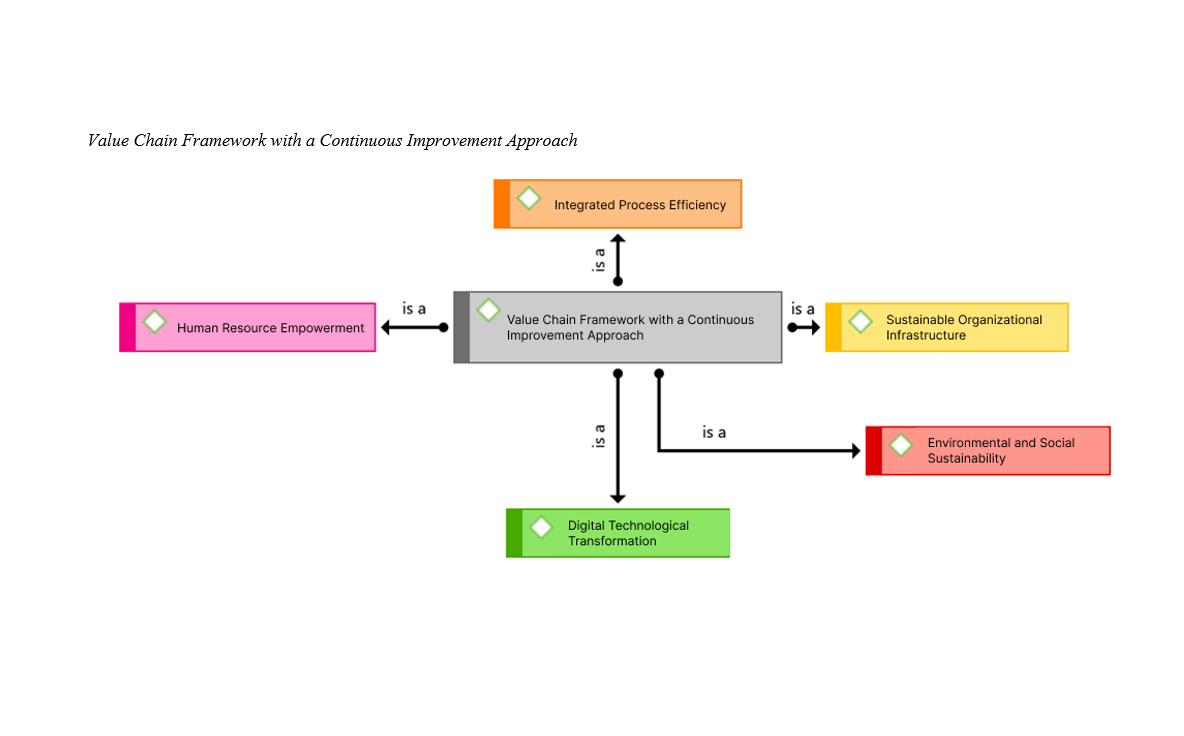Developing a Value Chain Framework with a Continuous Improvement Approach
Keywords:
Value Chain, Continuous Improvement, Cost and Time ManagementAbstract
The primary aim of this study is to develop a value chain framework grounded in the continuous improvement approach. Cost and time management assist water and wastewater companies in enhancing the processes and activities related to water supply, treatment, sewage management, and water distribution, ensuring a sustainable and enduring provision over time. To achieve this, the present research adopts a qualitative approach utilizing Braun and Clarke’s thematic analysis method to identify the key components and dimensions of the value chain from a continuous improvement perspective. The research employs Braun and Clarke’s thematic analysis approach. The statistical population of the study includes managers and experts in the water and wastewater sector, selected through purposive sampling. A total of 18 participants were carefully chosen. Data were collected through semi-structured interviews. Based on the interview analysis conducted using MAXQDA software, the model's themes were identified. The analysis revealed 123 initial themes categorized into 25 first-level subthemes and five second-level theme categories. The thematic analysis conducted to construct the value chain framework with a continuous improvement approach identified the following core components: sustainable organizational infrastructure, integrated process efficiency, digital technological transformation, human resource empowerment, and socio-environmental sustainability. This framework, by focusing on these five key components—sustainable organizational infrastructure, integrated process efficiency, digital technological transformation, human resource empowerment, and socio-environmental sustainability—represents a systematic effort to enhance competitiveness, organizational flexibility, and sustainable value creation. Each of these components, as derived from the qualitative findings and interviews, holds a central role in realizing the philosophy of continuous improvement and institutionalizing value addition throughout the entire chain of activities.
References
Alves, L., Faria, P. M., Cruz, E. F., Lopes, S. I., & António Miguel Rosado da, C. (2023). Eco-Gamification Platform to Promote Consumers’ Engagement in the Textile and Clothing Circular Value Chain. Sustainability, 15(6), 5398. https://doi.org/10.3390/su15065398
Aydin, N. S., & Tirkolaee, E. B. (2022). A systematic review of aggregate production planning literature with an outlook for sustainability and circularity. Environmental Development and Sustainability, 1-42. https://doi.org/10.1007/s10668-022-02304-8
Babaei, A., Khedmati, M., & Jokar, M. R. A. (2023). A branch and efficiency algorithm to design a sustainable two-echelon supply chain network considering traffic congestion and uncertainty. Environmental Science and Pollution Research, 30, 28274-28304. https://doi.org/10.1007/s11356-022-24063-9
Cui, R., Zhang, M., & Zhang, S. (2023). Cost optimization strategy and robust control strategy for dynamic supply chain system. Annals of Operations Research, 326(Suppl 1), 85. https://doi.org/10.1007/s10479-021-04385-6
Dzukroni, A. A., & Afandi, M. Y. (2023). Optimizing Sharia Insurance in Building Halal Value Chain. Malia Journal of Islamic Banking and Finance, 6(2), 145. https://doi.org/10.21043/malia.v6i2.16593
Egwim, C. N., Alaka, Hafiz, Demir, Eren, Balogun, Habeeb, Olu-Ajayi, Razak, Sulaimon, Ismail, Wusu, Godoyon, Yusuf, Wasiu, Muideen, Adegoke A. (2023). Artificial Intelligence in the Construction Industry: A Systematic Review of the Entire Construction Value Chain Lifecycle. Energies, 17(1), 182. https://doi.org/10.3390/en17010182
Gol Sabbagh, A. (2022). Investigating ERP Implementation in Supply Chain Management. 5th International Conference on Interdisciplinary Studies in Management and Engineering,
Hajiagha, S. H. R., Mahdiraji, H. A., Behnam, M., Nekoughadirli, B., & Joshi, R. (2022). A scenario-based robust time-cost tradeoff model to handle the effect of COVID-19 on supply chains project management. Operations Management Research, 15, 357-377. https://doi.org/10.1007/s12063-021-00195-y
Herath, H., & Endagamage, D. (2022). How the Supply Chain Management Practices influence on Operational Performance? A Case of Manufacturing Firms in Sri Lanka. Integrated Journal for Research in Arts and Humanities, 2(5), 1-7. https://doi.org/10.55544/ijrah.2.5.1
Karshi, M., Aghajani, H. A., & Soltanzadeh, J. (2023). Designing a qualitative model of a mission-oriented innovation system to complete the value chain of iron and steel industries in Ghadir International Mining and Industrial Development Company. Dynamic Management and Business Analysis, 2(2), 176-193. https://doi.org/10.61838/dmbaj.2.2.14
Kilima, F. T. M., Msalya, G., & Omore, A. O. (2024). Enhancing Capacity to Comply With Sustainability Standards in the Milk Value Chain in East Africa: Challenges, Prospects, and Policy Implications. Sustainability, 16(18), 8100. https://doi.org/10.3390/su16188100
Lin, J. (2024). Research on Artificial Intelligence and Trade in Emerging Markets - A Global Value Chain Perspective. Advances in Economics Management and Political Sciences, 118(1), 212-221. https://doi.org/10.54254/2754-1169/2024.18578
Nugroho, M. I. (2022). Global value chains participation to enhance export: Evidence from Indonesian apparel SMEs. Journal of Socioeconomics and Development, 5(1), 99-114. https://doi.org/10.31328/jsed.v5i1.3499
Piao, G., & Xiao, B. (2023). Analyzing the Effectiveness of Finance in Supply Chain in Solving the Financing Difficulties of SMEs Based on Grey Theory Model. Computational Intelligence and Neuroscience, 14. https://doi.org/10.1155/2022/7608937
Salari, M. (2021). Investigating the Impact of Supply Chain Management Process Strategies in Manufacturing Companies and Their Relationship with RFID Technology. 4th National and 1st International Conference on Modern Management and Business Models,
Saleheen, F., & Habib, M. (2023). Embedding attributes towards the supply chain performance measurement. Cleaner Logistics and Supply Chain, 6, 1-10. https://doi.org/10.1016/j.clscn.2022.100090
Seif Barghi, M., & Kafshian Ahar, H. (2022). Pricing and Delivery Time Decisions in a Dual-Channel Supply Chain with Traditional and Online Sales in Centralized and Decentralized Systems with Different Transportation Systems. Industrial Management Perspective, 12(1), 135-159. https://doi.org/10.52547/jimp.12.135
Vargas‐Bello‐Pérez, E., Espinoza-Sandoval, O. R., Rodríguez-Piñeros, S., & Ghavipanje, N. (2024). Supply and Value Chain of the Dairy Industry in Mexico. Ijanr, 51(3). https://doi.org/10.7764/ijanr.v51i3.2643
Vorkiani Pour, N., & Cheragheli, M. R. (2022). Value chain policy-making for entrepreneurship with a focus on sustainable urban development (case study: Cities of Golestan province). Urban Environment Planning and Development, 2(5), 61-72.
Wan, M. (2024). Research on the Decision Making of Value Chain Reconstruction of Chinese Port Enterprises Under the Background of Free Trade Zone Policy. Systems, 12(3), 91. https://doi.org/10.3390/systems12030091
Yang, W., Zhang, J., & Yan, H. (2021). Impacts of online consumer reviews on a dual-channel supply chain. Omega, 101, 102266. https://doi.org/10.1016/j.omega.2020.102266
Zarei, Y. (2022). Supply Chain Management and Its Driving Factors in Companies. 8th International Conference on Modern Management and Accounting Studies in Iran,

Downloads
Published
Submitted
Revised
Accepted
Issue
Section
License
Copyright (c) 2025 Maryam Khorshidi (Author); Hossein Adab; Hossein Moinzad, Jalal Haghight Monfard (Author)

This work is licensed under a Creative Commons Attribution-NonCommercial 4.0 International License.









